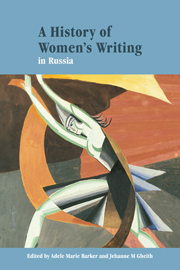Book contents
- Frontmatter
- Contents
- Notes on contributors
- Acknowledgments
- Note on transliteration
- List of abbreviations
- Introduction
- 1 Women's image in Russian medieval literature
- 2 Sappho, Corinna, and Niobe: genres and personae in Russian women's writing, 1760–1820
- 3 The inexperienced muse: Russian women and poetry in the first half of the nineteenth century
- 4 Women of the 1830s and 1850s: alternative periodizations
- 5 “A particle of our soul”: prerevolutionary autobiography by Russian women writers
- 6 The women of Russian Montparnasse (Paris, 1920–1940)
- 7 Women in Russian Symbolism: beyond the algebra of love
- 8 The eastern path of exile: Russian women's writing in China
- 9 Realist prose writers, 1881–1929
- 10 Women and gender in post-symbolist poetry and the Stalin era
- 11 Writing the female body politic (1945–1985)
- 12 In their own words? Soviet women writers and the search for self
- 13 Women's poetry since the sixties
- 14 The persistence of memory: women's prose since the sixties
- 15 Perestroika and post-soviet prose: from dazzle to dispersal
- Bibliographical guide to writers and their works
- Guide to further reading
- Index
14 - The persistence of memory: women's prose since the sixties
Published online by Cambridge University Press: 22 September 2009
- Frontmatter
- Contents
- Notes on contributors
- Acknowledgments
- Note on transliteration
- List of abbreviations
- Introduction
- 1 Women's image in Russian medieval literature
- 2 Sappho, Corinna, and Niobe: genres and personae in Russian women's writing, 1760–1820
- 3 The inexperienced muse: Russian women and poetry in the first half of the nineteenth century
- 4 Women of the 1830s and 1850s: alternative periodizations
- 5 “A particle of our soul”: prerevolutionary autobiography by Russian women writers
- 6 The women of Russian Montparnasse (Paris, 1920–1940)
- 7 Women in Russian Symbolism: beyond the algebra of love
- 8 The eastern path of exile: Russian women's writing in China
- 9 Realist prose writers, 1881–1929
- 10 Women and gender in post-symbolist poetry and the Stalin era
- 11 Writing the female body politic (1945–1985)
- 12 In their own words? Soviet women writers and the search for self
- 13 Women's poetry since the sixties
- 14 The persistence of memory: women's prose since the sixties
- 15 Perestroika and post-soviet prose: from dazzle to dispersal
- Bibliographical guide to writers and their works
- Guide to further reading
- Index
Summary
The period in Soviet literary life since Stalin's death in 1953 through glasnost in the mid-1980s has been one of the most volatile in Soviet letters. The thaw (ottepel') that followed on the heels of Stalin's death brought with it under Khrushchev a period of relative relaxation in literary censorship, allowing writers to write about formerly forbidden topics such as the camps, the purges, anti-Semitism, and the response of the leadership to World War II. The liberal reforms were soon followed, however, by a conservative backlash that came increasingly to characterize literary life under Brezhnev. The era was marked by the birth of the dissident movement, samizdat (self-publishing), and tamizdat (works published abroad), the preferred venues for those who refused to bend to the more conservative literary trends of the day and chose instead to publish outside the official literary establishment. Although the term zastoi (stagnation) has since the mid-1980s been used to describe the state of cultural and literary life during the Brezhnev era, it was also true that from time to time important and honest works (those by I. Grekova and Iurii Trifonov, for example) found their way into print through official literary channels in response to increased pressure from the writers themselves for greater latitude in speaking their minds. Similarly, new literary schools such as the village prose writers (derevenshchiki) came into being, depicting with nostalgic longing the rural life of Russia that lay outside the domain of official Party-mandated life.
- Type
- Chapter
- Information
- A History of Women's Writing in Russia , pp. 277 - 296Publisher: Cambridge University PressPrint publication year: 2002
- 1
- Cited by



